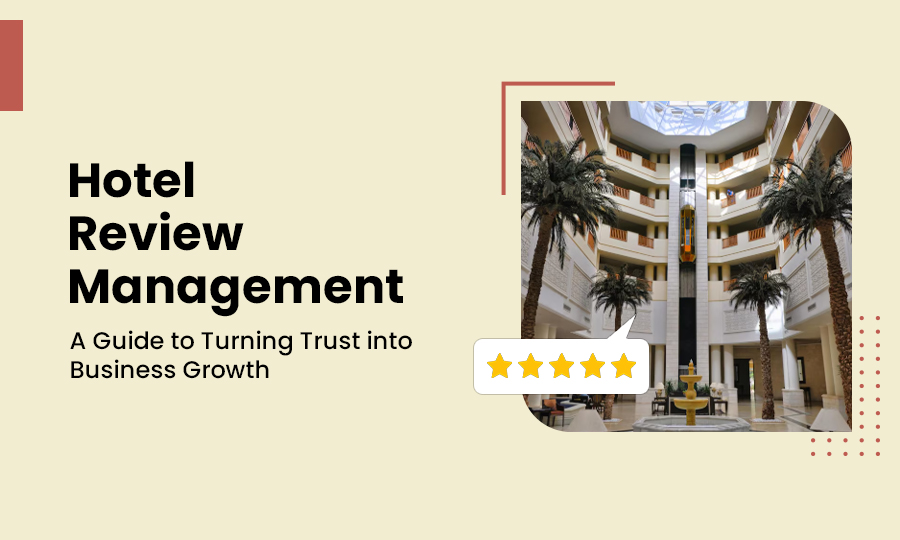In this digital era, online reviews play a crucial role in helping travelers decide which hotels to consider and which to avoid. The majority of travelers prefer to check online hotel reviews before booking an accommodation. Thus, it’s essential to enhance a hotel’s online reputation to gain a competitive edge in the hotel industry, and hotel review management (HRM) plays a crucial role in this strategy.
According to a 2013 study by TripAdvisor, 80% of travelers tend to read at least 6-12 online reviews before booking any hotel.
Every hotel must prioritize seeking effective review monitoring and management services from a renowned agency. The online reviews a hotel receives determine how travelers perceive the hotel before they actually seek its services.
This guide explains the major types of hotel reviews and provides impactful strategies for managing them effectively. Here in this blog, you’ll get to learn how you can manage your hotel reviews to improve your hotel’s online reputation. Explore our guide to succeed in today’s competitive hospitality sector.
What Is Hotel Review Management?
It refers to the process of actively monitoring, examining, and responding to online feedback of your hotel’s guests, shared on online review platforms. When you effectively manage your hotel reviews, it shapes your hotel’s online reputation and improves your guest satisfaction.
Your guests share their experience about their stay at your hotel, good or bad, to help others make informed decisions. People who are interested in staying at your hotel are more likely to check its online reviews on –
- Your hotel’s official website (customer testimonials)
- Hotel booking sites like Booking.com, Expedia, and MakeMyTrip
- Hotel review platforms like TripAdvisor
Effective management of hotel reviews can help you earn 5-star reviews. Hotel authorities must be skilled in handling online guest reviews to stay competitive in today’s competitive business landscape.
The HRM process requires you to –
- Track your hotel reviews across various sites
- Respond to your hotel reviews
- Resolve prospective guests’ queries and concerns
- Take necessary actions based on the guest feedback you’ve received
- Develop strategies to enhance the overall guest experience
You can attract more direct bookings and build a loyal online customer base by promoting your hotel reviews. This proactive approach will also help you foster a long-term relationship with your existing and potential customers.
How? Effective management of hotel reviews will showcase how much you value your guest feedback and strive to deliver the best possible service to your hotel guests. It will also encourage more guests to share their reviews about their stay in your hotel.
Why Hotel Review Management Matters?
Imagine someone has stayed in a hotel and reviewed it online. The person has shared real experiences of his/her stay at the specific hotel. Seeing the positive review, you will get interested in booking rooms at that hotel as you get to know about real experiences from someone who has already sought services from the hotel.
It just works like word-of-mouth recommendations!
Today, more travelers rely on online reviews to decide where to stay in cities around the world. So the effectiveness of traditional hotel advertising has declined over time! On the other hand, the impact of online hotel reviews is increasing every day.
If you fail to monitor and manage your customer reviews, it will damage your hotel’s digital presence and convey a negative perception about it. On the other hand, effective review management can drive more guests to your hotel by conveying a positive reputation for it across the web.
Did you know that nearly 8 out of 10 TripAdvisor users, 79% of them, are more likely to book a room at a hotel with higher ratings and reviews when choosing between two identical hotel properties?
The statistic shows how significantly online reviews influence travelers’ hotel booking decisions. Sounds extraordinary, right?
Let’s have a quick look at why hotel review management matters.
- Influences Booking Decisions
It allows you to promote your positive customer feedback through various popular online channels. When you promote your positive customer reviews, it will increase your hotel’s online visibility and positively influence travelers’ booking decisions.
It will encourage them more to choose your hotel for their stay. All thanks to your effective online review management strategies for hotels!
- Impacts Direct Revenue Growth
More bookings come with more revenue! Effective HRM strategies ensure more bookings that have a direct impact on your hotel’s overall revenue. Hotels with high online review scores often have higher room rents, which reduces the need for discounts.
It improves a hotel’s ranking on online travel agencies (OTAs) and search engines. This way, more potential guests can find your hotel online and book rooms.
- Builds Customer Trust
We’ve already discussed that effective review management requires you to promote your positive customer feedback, and it will increase your potential guests’ trust in your hotel services.
Additionally, when you promptly respond to your guest reviews, it shows that their opinions are valued and you’re committed to providing excellent service. Likewise, addressing negative reviews can provide you with an opportunity to resolve issues and win back your customers’ trust.
- Enhances Brand Image and Reputation
Effective HRM strategies help you establish a solid brand image of your hotel. And of course, a positive online reputation will attract more guests to your hotel. If you successfully build a positive reputation, it will help you gain a competitive edge over those with negative reviews or no reviews at all.
Let us tell you that a positive online reputation is critical for your hotel’s long-term success and sustainability. Thus, you must prioritize it!
4 Types of Hotel Reviews to Manage
Hotel reviews vary depending on the intention of sharing them. People share reviews after staying at a hotel and talk about their positive or negative experiences. There are some major types of hotel reviews that travelers commonly share, and you can witness them as well on different review sites.
Here, we’ve mentioned the four most common types of hotel reviews that you must prioritize to ultimately boost your hotel review management efforts. Let’s learn more about these four types of common hotel reviews.
- Guest Reviews on OTA Platforms
These are reviews that your hotel guests will share on online travel agency platforms.
What are OTA platforms? These are primary hotel booking platforms where people share their reviews about various branded hotels after they stay at those hotels. Other travelers who have an interest in staying in those specific hotels in the future, check the reviews and decide whether they should book a room there or not.
Example: Booking.com, Expedia, Hotels.com, TripAdvisor, Travelocity, Trip.com, and Airbnb
You can monitor your hotel’s online ratings, guest reviews, and guest sentiment on those platforms. Some additional benefits? Yes, you can also identify service gaps, highlight positive experiences of your guests to attract prospective guests, and address negative feedback.
Fact Check: In 2024, 43% travelers are more likely to use OTA platforms for booking hotels.
- Google Reviews
This is a platform from Google that allows your hotel guests to rate and review their experience of staying at your hotel. Google reviews help other travelers make informed hotel booking decisions.
What can you do in Google Reviews? You can track ratings and reviews left on your hotel’s Google Business Profile (GBP). This platform also helps you in monitoring your hotel review volume and sentiment. You can respond to those Google reviews and use that feedback to improve your service.
What makes Google a top hotel review site? A study has revealed that 72% of hotel bookings happen within 48 hours following a Google search. Thus, Google tends to index your hotel’s online reviews done on Google Business Profile (GBP) pages rather than other online review sites.
If your hotel has an active GBP profile, it can achieve better online visibility than those hotels without a GBP profile. This search-and-book process makes Google one of the top online hotel review sites.
- Social Media Reviews
Social media platforms offer a space for hotel guests to leave their feedback related to their experience of staying at your hotel and seeking its services. For example, you have a business page for your hotel on Facebook. People who have stayed at your hotel can leave their reviews on your hotel’s Facebook business page.
Example: Facebook, Twitter, and Instagram
What can you do? You can engage guests of your hotel, understand what has been lacking in your hotel service, and what your guests have liked the most about it. You can track your hotel name mentions across the social media platforms and the customer comments your posts have received.
Furthermore, social media reviews allow you to address your guests’ concerns and leverage positive feedback to improve your hotel service.
Want to promote impressive customer feedback on your social media channels? It’s a great idea, though! Then people can easily find many positive word of mouth about your hotel when they search for your hotel’s name on social media platforms.
- Survey Results and Feedback Form
These two can provide you with direct insights into your hotel guest satisfaction and improvement areas. You can prepare an engaging questionnaire for pre-stay and post-stay surveys to collect feedback from your hotel guests, regarding what they’ve liked and disliked about your hotel. You can provide your guests with the options to rate your hotel between 1-10 (great-good-can be better-disappointed).
Some example questions to collect hotel reviews through online guest surveys
- How did you book your hotel reservation at (your hotel name)?
- How would you rate your check-in and check-out experience at our hotel?
- How would you rate your overall experience of your stay?
- Were the hotel amenities easily accessible and convenient to use?
- How satisfied were you with the quality of food served at our hotel’s restaurant?
- How would you rate the pricing of our hotel rooms and other paid facilities?
- Were our customer service representatives supportive enough to help you book your reservation?
Is the feedback form also an option?
Yes, you can share feedback from your hotel guests to know about their experience. Feedback forms will help you identify specific areas of your guests’ dissatisfaction and track guest review trends.
Some example questions to collect hotel reviews through online feedback
- What is your age?
- Where do you reside?
- From where did you come to know about our hotel?
- Mention the primary reason for your hotel stay? (Vacation/ business/ event/ others)
- How frequently do you travel?
Top Strategies to Follow for Effective Hotel Review Management
In previous times, most hotel owners used to rely on traditional advertising methods like banners, hoardings, television, newspapers, and leaflets to promote their properties and services. But with the increasing usage of digital gadgets, they no longer need to solely depend on these promotional methods.
Hotel owners can now promote their success stories, positive guest reviews, and even collect the same through online channels. Additionally, it allows them to engage with their guests by responding to their reviews and initiating meaningful conversations.
Dealing with hotel reviews can be frustrating sometimes, even if you’re a veteran hotel owner. It’s mainly because hotel authorities often have limited ways to respond to online reviews and can be easily targeted by fake or spam feedback.
Thus, effective hotel review management strategies are crucial!
However, just like any other strategy, online review management for hotels plays a major role in improving or damaging a hotel’s reputation online. It can either be a hit or a miss! To ensure success, you can hire a reputable hotel reputation management agency.
Below, we’ll talk about the top 8 online review management strategies so that you can seamlessly monitor and handle your hotel reviews. Explore our proven strategies and establish a strong reputation for your hotel with countless positive guest reviews. Let’s get started!
Strategy 1: Set Up Your Review Monitoring System
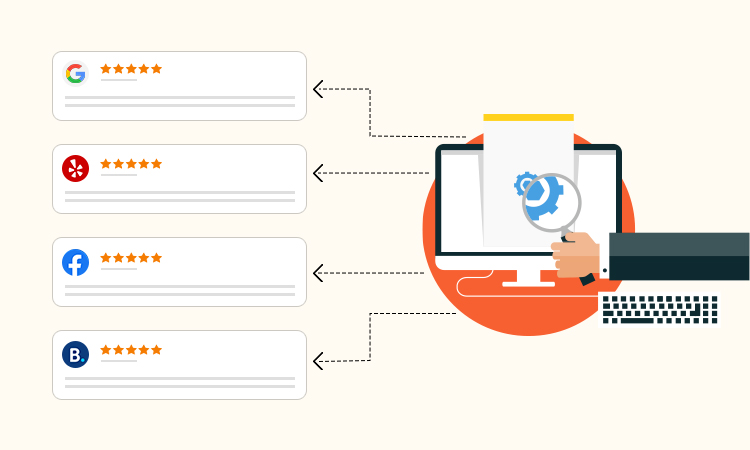
To start your online review management for hotels, the first step is to identify platforms where your guests are more likely to share their reviews about your hotel. Choose platforms like –
- Yelp
- Booking.com
- TripAdvisor
- Capterra
Always remember, if you choose a review platform that is not commonly used by your guests, all your review management efforts will be of no use!
You need to configure the selected platform to send alerts whenever anyone posts a new review about your hotel on those platforms. It’s all about ensuring you’re always up-to-date.
- Set up review alerts
To set up review alerts for your hotels, you need to adjust the notification settings on various review platforms. Here’s how you can do it –
For Google:
Google offers you to use its feature to get alerts or notifications through email for new reviews or mentions of your hotel. You can enable these alerts within your Google Business Profile (GBP). Follow the steps below –
Log in to your GBP profile at www.google.com/business > click on the ‘Settings’ tab, usually located in the left-hand navigation menu > click on ‘manage notifications’ > find the option related to Google Reviews > set it to ‘All’ or email notifications > save your changes
For TripAdvisor:
This platform also allows you to set up email alerts for new reviews within your business account on TripAdvisor. Adjust your notification settings like this –
Claim your business profile on TripAdvisor > verify your ownership through email or phone > log in to your TripAdvisor account > navigate to ‘Management Center’ for your hotel > click on ‘Notifications’ or ‘Review Alerts’
Turn on email notification > provide your accurate and updated email address > clear spam or junk folders if you’re still not receiving email alerts for TripAdvisor reviews
Other OTAs:
You can also set up email notification alerts for reviews received through other online travel agencies (OTAs). These platforms also allow you to adjust notification settings to get real-time alerts for new reviews.
- Tools to Use to Centralize the Process
You need to choose a tool to centralize and analyze your hotel reviews, such as TrustYou, ReviewPro, and Revianate. These tools often allow you to create rules that automatically generate tickets or tasks for staff depending on the review content.
The following three are the most popular and widely used tools that you can use to analyze your hotel reviews.
- TrustYou – This tool offers you to monitor your hotel reviews and analyze your guest sentiment. Additionally, this platform provides automated review response suggestions that you can use while replying to your hotel reviews.
- Revinate – This specific tool focuses on encouraging guest feedback. You can manage your response to the hotel reviews and set up customized ticketing tools for review follow-up. You can assign tasks to your team to follow up with post-stay review requests from your hotel guests.
- ReviewPro – It’s known for the Global Review Index (GRI) and competitive benchmarking facilities. Want to set up personalized review alerts? This tool provides this feature as well. You can even conduct online customizable surveys and improve guest satisfaction by effectively responding to both positive or negative reviews.
Strategy 2: Analyze Your Existing Reviews

Did you know that a customer is 72% more likely to value guest ratings more than a hotel’s big brand name?
Thus, hotel review management is no longer a choice for you; it’s become a necessity to improve your hotel’s online image. Every hotel owner must prioritize monitoring and analyzing their existing reviews, along with generating new reviews from guests.
Here, we’ve mentioned some steps to effortlessly analyze your existing hotel guest reviews.
- Categorize Reviews
The first step is to categorize the reviews you’ve already received from your hotel guests. You need to divide your existing reviews into various categories, including –
- Hotel service
- Customer support
- Cleanliness
- Amenities
- Price affordability
- Overall experience
- Food quality
- Location
After completing the categorization, you must find the recurring positive and negative themes within each category.
- Analyze Trends
It’s time to monitor the overall sentiment of existing reviews over time. Is the guest sentiment positive, negative, or neutral? Understanding the sentiment will help you find patterns in your customer feedback that may be associated with specific services, staff, or events at your hotel.
We suggest that you benchmark your reviews against those competitors specifically to understand your hotel’s strengths and drawbacks.
- Address Issues based on Guest Data Insights
Always consider addressing the negative feedback you’ve received so far and implement changes to improve your hotel services. Additionally, promoting your hotel’s strengths can also help you attract more guests to your hotel.
Engage more with your guests by responding to their reviews and acknowledging their feedback. It will showcase that you truly value your guests’ opinions and always strive to improve your hotel services.
- Monitor Constantly
Have you scheduled regular review audits? If not, schedule the audits weekly, monthly, or quarterly to track changes and trends in your guest reviews. Never forget to keep an eye on every review platform and social media site to check whether there are any new reviews and mentions about your hotel.
Strategy 3: Train Your Staff to Collect Guest Feedback

This is one of the most crucial steps to managing your hotel reviews. If your staff are not aware of the secrets of effective guest review generation, you may struggle later to gather customer feedback that matters.
Always focus on training your hotel staff about –
- Clear communication with guests
- Culture of valuing feedback
- Encouraging guests to share their genuine reviews
- Sending post-stay review request emails
- Sending follow-up emails
- Prompt response to every type of review
Now it’s time to know how you can train them most impactfully. Here we’ve listed out some steps to help you understand the training process.
Step 1: Explain to your staff why gathering guest feedback is important for your hotel’s online reputation and how it can significantly enhance your hotel’s digital presence.
Step 2: We suggest you provide them with structured training on different guest feedback channels.
Step 3: You should teach your hotel staff how to ask the right questions to the guests. You can create role-play scenarios with your staff to build their confidence.
Step 4: Make them understand how guest reviews can help them identify the areas for improvement in their hotel services, and it will eventually enhance their guest satisfaction.
Step 5: When you highlight how guest feedback helps them learn new skills and contribute to a better work environment, they’ll be more eager to work more tirelessly to deliver the best possible service to the hotel guests.
Step 6: You can train your staff regarding various feedback collection methods, such as –
- Comment cards
- Automated emails
- Online reviews
- Mobile app feedback features
- Feedback boxes
- In-person interactions
Step 7: Train your staff on how they can effectively develop customer review management strategies.
Step 8: Emphasize to them the significance of active listening during customer interactions. You must encourage your staff to be attentive during both verbal and non-verbal communication.
Step 9: Guide your staff to be polite and ask for feedback using open-ended questions, as it encourages detailed responses from your customers.
Step 10: Show your staff how they can follow up with guests after they send review request emails. Your staff must be skilled in addressing concerns and resolving issues mentioned in negative feedback.
Strategy 4: Manage Your Hotel Reviews on OTAs
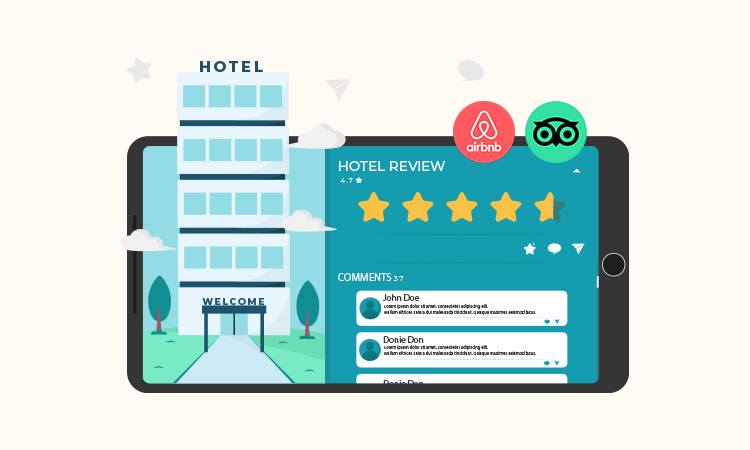
Online travel agencies (OTAs) are a great medium to reach your potential guests and drive more hotel bookings. Want to know two interacting factors about these OTAs?
- OTA platforms also offer a large amount of important data about a hotel, so it becomes easy for travelers to choose the best stay for them.
- Additionally, it provides reviews from other guests as well, which just work like word-of-mouth recommendations.
A 2022 study has revealed that nearly 70% of people prefer to book hotels on OTA platforms. Monitoring reviews on OTAs will help you get valuable insights into how your hotel is performing and identify the areas for improvement.
Tips to Manage Your Hotel Reviews on OTAs
Just like any other hotel review management strategy, you need to learn about certain steps to efficiently manage reviews on OTAs. Here we’ve mentioned some helpful tips and tricks for you.
- Set up alerts: You can set up alerts on these OTA platforms to get notifications whenever your hotel receives a new review. You can track your hotel reviews and ensure prompt response.
- Track reviews across platforms: Remember one thing, not all your guests will leave reviews on the same OTA platform. So you need to track the reviews across different platforms like TripAdvisor, Booking.com, Expedia, Facebook, and more.
- Respond to reviews: You must respond to those reviews, even the negative ones. Keep your calm and try to respond with utmost empathy and professionalism. It will show that you care about your guests’ opinions and are committed to delivering the best possible service.
- Be proactive: You shouldn’t wait for your hotel guests to leave reviews; rather, you must reach out to them in advance to request their post-stay feedback.
- Track your progress: Tracking your review progress over time to see whether your hotel reviews are improving or not.
Tips to Track Hotel Reviews on OTAs
TripAdvisor and Airbnb are the two most popular OTA platforms, widely used for hotel bookings. People can check pricing, compare hotels, and track reviews before they book an accommodation. Thus, you must have a clear idea of how you can impactfully handle hotel reviews received on these two OTA platforms.
Manage Hotel Reviews on TripAdvisor
Is TripAdvisor the most preferred OTA platform of your hotel guests?
If yes, then the following tips will definitely help you. But let’s first learn more about how TripAdvisor works.
- Your hotel guests can post reviews anytime after their stay. They can share their experience based on various aspects of your hotel, such as cleanliness, food, amenities, and other services.
- Reviews on TripAdvisor are visible to everyone. It helps future guests make informed hotel booking decisions based on the previous guest experiences.
- As a hotel owner or a member of the hotel authority, you can respond to your guest reviews on TripAdvisor. You can address both positive and negative feedback through this platform.
- Positive reviews on TripAdvisor can boost your hotel’s search rankings and enhance its credibility. And the reason is that most travelers have an unbreakable trust in this platform for hotel recommendations!
Any drawbacks?
Yes, it has! TripAdvisor is more prone to fake or malicious reviews that can damage your hotel’s online reputation.
Some Tips and Tricks for You to Use TripAdvisor More Effectively
- When a guest is at the checkout page, don’t forget to ask your satisfied guests to share their experience online.
- After receiving positive reviews, always show your appreciation and thank the guests.
- You must regularly check TripAdvisor to track new reviews so you can respond to them promptly.
- Want to let people know that you’ve received a ton of positive reviews? Promote these reviews on your hotel’s social media channel.
Manage Hotel Reviews on Airbnb
This platform has a different take on reviews!
This platform allows both the hotel authority and the guests to review each other. Unique feature, right? This mutual system keeps things fair and reduces the likelihood of receiving fake reviews.
Here’s how Airbnb works:
- As we already told you, both guests and hotel authorities can write reviews about each other within a two-week window. Those reviews are published simultaneously, maintaining transparency to help guests make better hotel booking decisions.
- You can request a guest to have verified IDs and badges before booking the hotel. A guest’s detailed profile with clear pictures will help the hotel owners decide if a guest is suitable or not.
- All users can link their Airbnb profiles to social media, which allows hotel authorities to see mutual friends and their other reviews.
Just like any other OTA platform, Airbnb has some flaws as well. It also sometimes fails to detect fake reviews, which can harm a hotel’s online reputation. When someone links their Airbnb profile to social media, the hotel authorities can get access to the person who is coming to stay at their property and their contact details as well.
Strategy 5: Encourage More Authentic Guest Reviews
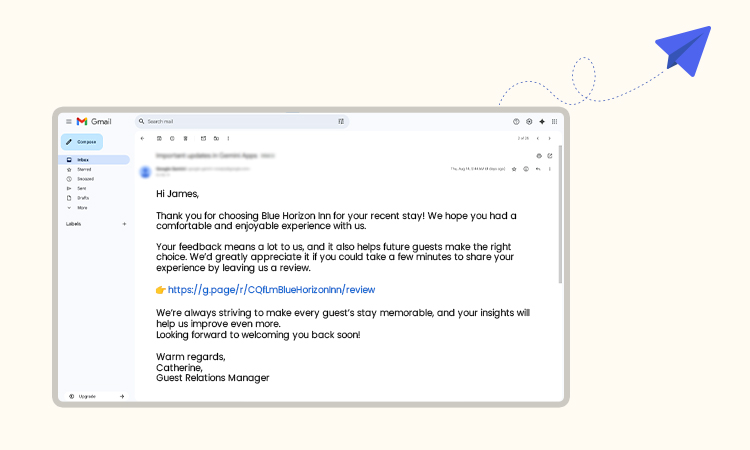
Effectively encouraging genuine guest reviews is a crucial part of online hotel review management strategies. Focus on making the process easy and personalizing the review requests to showcase how much you value your guests’ opinions.
Now the question comes, how will you encourage more authentic reviews for your hotel? With the right methods, you can do this seamlessly. Let’s have a look!
- Make the review submission process easy – Are your guests facing issues while submitting reviews? If yes, then they may not be interested in sharing their reviews. Thus, you must ensure that the way your hotel guests share their reviews is easy to understand and perform.
- Offer direct review site link – Provide direct review submission links with your review request email so that your guests can easily leave their reviews. It’s all about making it easy for your guests to navigate the review sites by providing detailed and clear instructions.
- Personalize your emails – Send emails by addressing your recipient’s name in the email. It will enhance the individualization of your review request email and make your guests feel valued. Mention specific details of their stay to show your genuine interest and make the email more personal.
- Remind your guests about sharing reviews – You can place cards or signs in your hotel rooms with QR codes. Ensure that these codes lead the guests directly to review sites. You can offer links to different review platforms based on different guest preferences.
- Explain the importance – Always let your guests know why their feedback is valuable for your hotel and how it will help you improve guest experience.
- Use your guests’ preferred channels – We suggest that you send review requests through SMS, email, or social media direct messaging, based on which is preferred by your guests.
- Offer incentives – As a hotel owner, you can send small rewards to guests for sharing their reviews, such as discounts on their next stay, complimentary meals, payment deals, and the like.
- Automate your review emails – Use a suitable reputation management software to automate review requests after check-in and check-out.
Strategy 6: Respond to Your Hotel Reviews
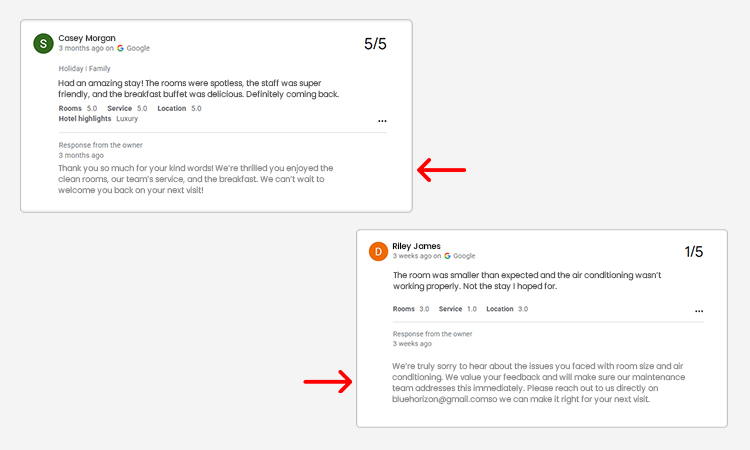
Now that you know how to encourage reviews from your hotel guests, it’s time to respond to your hotel reviews. It’s a skill! You’ve to learn it to ensure the effectiveness of your review responses.
You can develop effective online review management strategies for your hotel to ensure the effectiveness of your review response. Here we will discuss some crucial steps to respond to your hotel reviews more effectively!
Step 1: Develop a review response strategy that suits all your requirements. Train your hotel staff how to effectively respond to your guest reviews with ultimate professionalism.
Step 2: Showcase your appreciation for those guests who have shared positive reviews. Acknowledge them for taking the time to share reviews; this is best for building positive relationships with your hotel guests.
Example: Showcase your gratitude like “Thank you for your kind words! We’re thrilled to know that you enjoyed your stay at our hotel. Visit us soon!”
Step 3: Always respond with empathy and a willingness to address the issue faced by those guests who have shared one negative review about your hotel. You must acknowledge their concerns and offer them the best possible solutions. You can also invite those to contact you personally for further communication. Trust us, it’s best to take such a conversation offline.
Example: “We’re sorry to hear about your unfavorable experience during your stay at our hotel. We take quality control seriously and would like to know more about your concern. Kindly contact us directly at (your email ID or phone number) to help us find a resolution.”
Step 4: We recommend that you reach out to your guests after their stay, especially to those who’ve not shared any reviews. You can send review request emails along with the follow-up messages asking for their genuine feedback.
Step 5: Time is everything! Imagine sending a response to a negative review when resolving the issue is of no use. Prompt response plays a major role in hotel review management. You must aim to swiftly respond to guest reviews – both positive and negative. Always remember, the longer your guests have to wait for your response, the more frustrated they might become.
Step 6: Promised to improve a specific service of your hotel while responding to a negative review? Try to act on your promise; failing to do so can damage your hotel’s reliability factors and brand image. Make a change based on the feedback you’ve received and try to maintain your brand credibility!
Step 7: An apology, if it’s genuine, can help you win back your guest’s trust. If the mistake is from your hotel’s end, there is nothing wrong with apologizing to the guests for the inconvenience caused.
Example: ‘We apologize for the inconvenience. We are trying to find the best resolution for your concern.’
Step 8: Share your great reviews on your hotel’s official website, social media channels, and even as a crucial element of email marketing. It’s a great way to showcase your strengths and make your guests feel more valued.
Strategy 7: Prevent Bad Reviews from Guests
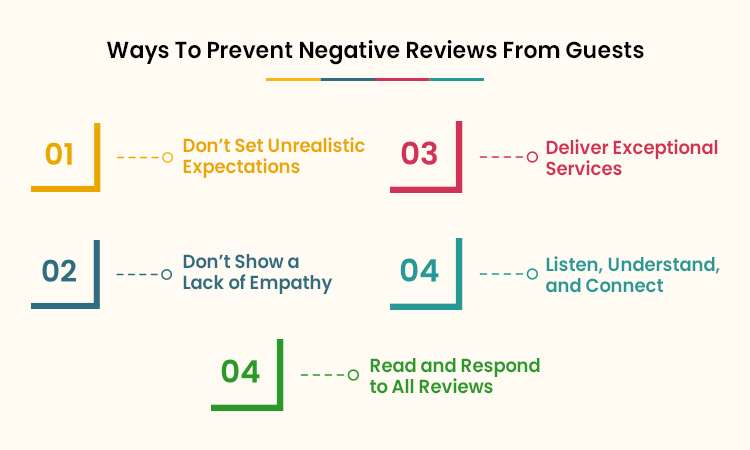
Receiving negative reviews from your hotel guests for a long time?
It’s time to implement beneficial negative review management strategies for your hotel. Bad reviews often provide you with important data insights that you can use to improve your hotel services.
But this is not what you should ask for – too many negative reviews can damage your hotel’s brand reputation! Here are some ways to prevent negative reviews from guests.
- Don’t Set Unrealistic Expectations – Be honest on your end in your hotel property listing description; never mention any facility that you don’t offer at your hotel. If there are any limitations of your hotel, highlight those while promoting your business. You shouldn’t over-promise as it can set unrealistic expectations for your guests, and failing to meet those can lead to negative reviews.
- Don’t Show a Lack of Empathy – Don’t think from a hotel owner’s perspective; rather, put yourself in the place of a guest and try to understand their concern. How you respond to a negative review determines whether the other travelers will consider your hotel in the future or not.
Fact-check: 56% of customers are more likely to change their opinion about a business if they see a bad response from the business to a guest review.
- Deliver Exceptional Services – Nothing is better than delivering exceptional services to your guests! Always strive to exceed your guests’ expectations to drive more positive reviews.
- Listen, Understand, and Connect – Be a good listener! Yes, it’s crucial to listen and understand what your guests want to convey in their negative reviews. Actively listen to them, understand their requirements, and build a strong connection with them through effective communication.
- Read and Respond to All Reviews – You can monitor feedback channels to keep track of your new and existing reviews. Acknowledge your review promptly and address every review with empathy.
Strategy 8: Track Your Hotel Review Metrics
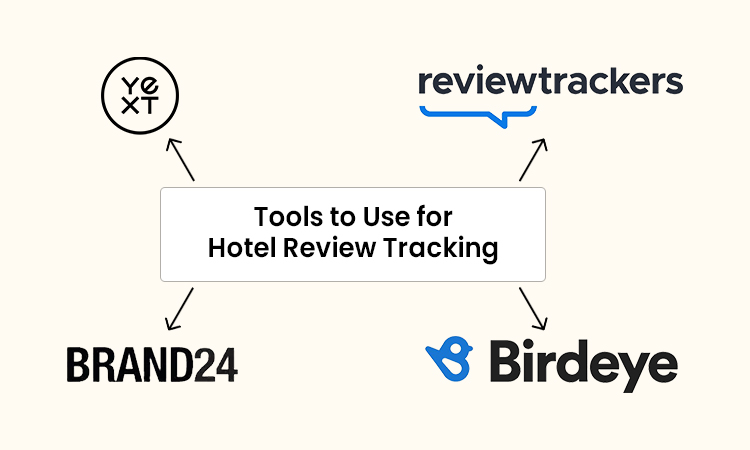
The final but one of the most important review management strategies for hotels is to track the progress – your hotel review metrics! The following are some metrics that you must prioritize tracking to understand which strategy is working and which isn’t.
- Hotel overall performance summary – A general overview of your hotel’s performance, such as occupancy rate, revenue per available room, and average daily rate
- Review breakdowns – A detailed overview of the guest reviews you’ve received so far, categorized by positive, neutral, and negative sentiment
- Average review score trend – How the average review score has changed over time, categorized by different review platforms
- Review channels summary – A total number of reviews received across various online review channels
- Review frequency – How often you receive hotel reviews, and the volume of your guest feedback
- Element analysis – Review categorization by specific elements within your hotel, including location, comfort, cleanliness, customer service, value, and quality of rooms.
Tools to Use for Seamless Hotel Review Tracking
The process is quite complex, but it can be simplified with the right usage of helpful tools. Wondering which tools you can use. Let’s find out!
- Brand24: It’s a comprehensive tool that you can use to track your online brand mentions across social media, news sites, and other review platforms.
- ReviewTrackers: This tool is mainly focused on review management, enabling you to track your guest reviews from multiple platforms. You can also perform sentiment analysis of your guests and effortlessly respond to feedback.
- Birdeye: It offers features for online review management and customer surveys. As a hotel owner, you can actively manage your business listings and gather more guest feedback.
- Yext: This one helps hotel authorities to manage their online business listings and online reviews across various platforms.
FAQs
Here are some frequently asked questions about online review management for hotels.
The examples of good review management for hotels are responding to every review, encouraging guest reviews, addressing concerns mentioned in those reviews, and promoting those to drive new guests to a hotel. It also includes keeping a track of the online reviews a hotel receives over time.
You can explore our guide to learn how you can start with online reputation management. If you lack a skilled team or proper knowledge, you can hire professional online review management services from a renowned agency.
If you’re receiving spam reviews for your hotel, you can try to identify the core issue behind it. Spam reviews can be reported on various review platforms after submitting valid proof. To deal with spam online reviews, you can professionally respond to those and acknowledge the issues. But if they violate any guidelines of the review sites, reporting those reviews is the best option.
Maybe you lack the proper skills to encourage your guests to share reviews. You need to send post-stay review requests to your existing guests and encourage them to share their feedback. Apart from these, you can follow up with your guests regarding their hotel reviews. Additionally, you can provide a direct link to your review sites with the email.
Conclusion
As a hotel owner, it is quite common to receive various types of online reviews. They can be positive or negative, and even neutral! They can either make or break your hotel’s credibility. Review management is a crucial part of your hotel’s online brand reputation.
From setting up a review management system to training your staff to generate more online reviews and respond to every feedback you receive, hotel review management covers it all.
You must have a clear idea of how to execute these strategies. We hope our comprehensive guide will help you implement the proven strategies and ensure their effectiveness. Still have doubts? You can seek professional guidance from an online reputation management agency.

